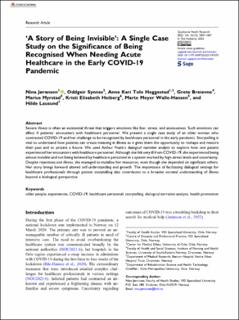| dc.contributor.author | Jøranson, Nina | |
| dc.contributor.author | Synnes, Oddgeir | |
| dc.contributor.author | Heggestad, Anne Kari Tolo | |
| dc.contributor.author | Breievne, Grete | |
| dc.contributor.author | Myrstad, Marius | |
| dc.contributor.author | Heiberg, Kristi Elisabeth | |
| dc.contributor.author | Walle-Hansen, Marte | |
| dc.contributor.author | Lausund, Hilde | |
| dc.date.accessioned | 2024-02-05T12:30:13Z | |
| dc.date.available | 2024-02-05T12:30:13Z | |
| dc.date.created | 2023-09-27T12:58:38Z | |
| dc.date.issued | 2023 | |
| dc.identifier.citation | Qualitative Health Research. 2023, . | en_US |
| dc.identifier.issn | 1049-7323 | |
| dc.identifier.uri | https://hdl.handle.net/11250/3115608 | |
| dc.description.abstract | Severe illness is often an existential threat that triggers emotions like fear, stress, and anxiousness. Such emotions can affect ill patients’ encounters with healthcare personnel. We present a single case study of an older woman who contracted COVID-19 and her challenge to be recognised by healthcare personnel in the early pandemic. Storytelling is vital to understand how patients can create meaning in illness as it gives them the opportunity to reshape and restore their past and to project a future. We used Arthur Frank’s dialogical narrative analysis to explore how one patient experienced her encounters with healthcare personnel. Although she felt very ill from COVID-19, she experienced being almost invisible and not being believed by healthcare personnel in a system marked by high stress levels and uncertainty. Despite rejections and illness, she managed to mobilise her resources, even though she depended on significant others. Her story brings forward altered self-understanding and growth. The importance of facilitating dialogical settings for healthcare professionals through patient storytelling also contributes to a broader societal understanding of illness beyond a biological perspective. | en_US |
| dc.language.iso | eng | en_US |
| dc.rights | Navngivelse 4.0 Internasjonal | * |
| dc.rights.uri | http://creativecommons.org/licenses/by/4.0/deed.no | * |
| dc.title | ‘A Story of Being Invisible’: A Single Case Study on the Significance of Being Recognised When Needing Acute Healthcare in the Early COVID-19 Pandemic | en_US |
| dc.type | Peer reviewed | en_US |
| dc.type | Journal article | en_US |
| dc.description.version | publishedVersion | en_US |
| cristin.ispublished | true | |
| cristin.fulltext | original | |
| cristin.qualitycode | 2 | |
| dc.identifier.doi | 10.1177/10497323231197375 | |
| dc.identifier.cristin | 2179403 | |
| dc.source.journal | Qualitative Health Research | en_US |
| dc.source.pagenumber | 0 | en_US |

